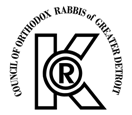
K-COR Kashrus Division
What is Kosher?
What is kosher food?
Kosher food refers to consumables that comply with a comprehensive set of Jewish dietary laws. The subject of kosher law, or kashrus, includes not only which foods are acceptable to eat and which ones are not, but also how the foods are prepared and eaten.
K-COR Kosher Symbol
Because the manufacture of today’s processed foods involves so many ingredients and methods, a number of certifying kosher oversight agencies – including the Council of Orthodox Rabbis’ K-COR Kosher Certification division – have developed in order to assess and certify food production processes. Once certifying agencies can reliably confirm that a product complies with kashrus laws, they can authorize a producer to affix a kosher certification symbol to the product’s packaging in order to publicize the certification. Contrary to popular myth, when a food is certified as kosher, it does not mean that it was “blessed by a rabbi”.
Who eats kosher food?
In addition to the Torah-observant Jewish population, many seek out kosher food for a variety of other reasons. Vegetarians seek “pareve” or “dairy” kosher certification symbols, which certify that the production process is meat-free. Individuals with dairy allergies may seek products that are certified as “pareve” or meat products, which certify that the production process is dairy-free. In addition, people of other, non-Jewish faiths and ideologies turn to kosher certification in order maintain a dietary lifestyle in line with their religious and ideological views.
Where do the laws of kashrus originate?
The laws of kashrus originate in the Torah (the Jewish bible), given by God to Moses and the Jewish people at Mount Sinai more than 3,300 years ago.
What are some examples of kosher laws?
Learn more! Additional kashrus resources:
- Kosher meat must come from ruminant (cud-chewing) mammals with cloven hooves, and must be slaughtered in accordance with kosher law. Beef from a properly slaughtered cow can be kosher.
- Kosher poultry species require a reliable tradition for their kosher status, and must be slaughtered in accordance with kosher law. Chickens, properly slaughtered, can be kosher.
- Consumption of blood is forbidden. As a result, the preparation process for kosher meat involves meticulous cleaning and salting of the meat to remove blood.
- Consumption of most insects is forbidden. Vegetables that are commonly subject to infestation must be carefully checked before consumption.
- Kosher fish must have fins and scales. This excludes all shellfish, such as lobster and crab.
- Meat products and dairy products cannot be prepared or eaten together. Kosher oversight agencies often append their certification symbol with designations for “dairy”, “meat”, or “pareve” (neither diary nor meat) to denote the product’s ingredients or preparation.
- Equipment and vessels used in the preparation of kosher food must be exclusively designated for kosher use, and is classified as “dairy”, “meat”, or “pareve”.
Can my product get certified by the K-COR kosher certification?
The certification process involves two initial steps:
Become K-COR Kosher Certified today!
Contact the K-COR at (248) 559-5005 x 101 or send an email to cor@cordetroit.com or


